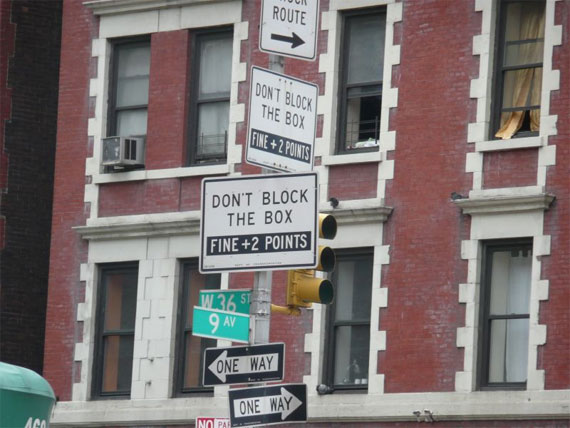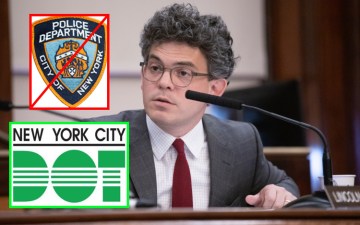“Don’t Block the Box” Bill Clears Albany

With 2800 agents able to enforce rules against blocking the box, drivers may soon take these signs seriously.
A bill intended to step up enforcement against drivers who block the box made it through the state legislature last Thursday. While the measure is not expected to play a major role in traffic reduction, it should improve conditions for pedestrians and residents on some of New York’s most congested streets, as long as agents follow through on strict enforcement.
The bill reclassifies blocking the box from a moving violation to a parking violation, a switch that enables all 2800 of the city’s traffic agents to issue citations for the offense. Previously, only cops and a small number of agents had that ability. The bill also bumps up the penalty from $50 to $115.
In a 2006 study conducted by Borough President Scott Stringer’s office [PDF], more than 3,000 blocking the box violations were observed at 10 locations in Manhattan during a single nine-hour period, but no driver received a ticket.
At the worst locations — near the entrances to the Lincoln and Holland tunnels — box-blocking vehicles clog the crosswalk constantly during peak hours. "That is a huge part of complaints on Varick Street and Broome Street, where pedestrians can’t get across the intersection," said Ian Dutton of the Community Board 2 transportation committee, which passed a resolution in favor of the bill last Tuesday. "This is a beginning step to make the enforcement more comprehensive."
Near the Lincoln Tunnel, the river of traffic can sometimes form a continuous queue on Ninth Avenue, spilling over into cross streets. "Everybody’s blocking everybody," said Christine Berthet of the Clinton/Hell’s Kitchen Coalition for Pedestrian Safety (ChekPeds). "You see the backup going from 36th to 57th Street on Saturday and Sunday nights."
The fact that no one wants to give up their spot in the queue causes problems for first responders. Engine 34 and Ladder 21, for instance, often face delays leaving the firehouse on 38th Street because intersections are blocked.
Then there are the noise problems. "From a quality of life standpoint," said Berthet, "you can barely function inside your apartment
because the honking becomes unbearable. Residents have had to call
police because people get out from their cars and get into fistfights,
it’s so infuriating."
She hopes that stepped up enforcement will impose some order on the situation, noting that the new law will only be effective if agents shift their focus accordingly. "It’s a conflict between giving the tickets out and moving cars," she said. "I just hope the NYPD will really educate the agents to change their priorities. That’s going to be a cultural change that’s welcome."
While clamping down on one type of traffic violation pales in comparison to what Albany has rejected during the current legislative session, even this relatively minor measure has aroused indignation among many drivers, if the attitudes captured by NY1 last week are any indication:
"I think only cops should be able to give the tickets to be honest with you," said one driver.
"I think with this kind of congestion, it’s very difficult to implement such a law, and it wouldn’t be fair," said another.
"I think, like most drivers, we just don’t like the traffic agents," said a third.
Photo: Claire’s overseas/Flickr
